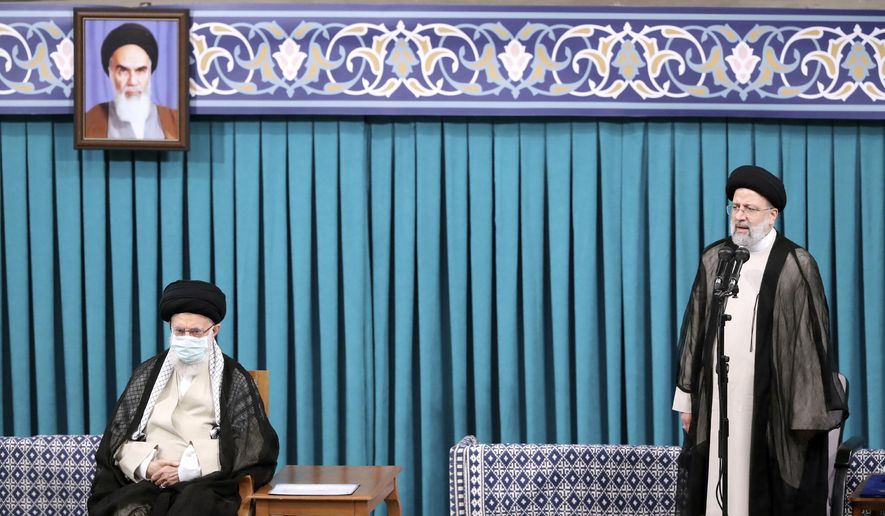Iran’s incoming hard-line president vowed Tuesday to fight “tyrannical sanctions” imposed on his country by the U.S., suggesting Tehran’s posture toward the Biden administration’s diplomatic outreach will become more standoffish.
President-elect Ebrahim Raisi promised to improve the Iranian economy, but not at the “will of foreigners.” He made the remarks in a televised speech as a part of a two-step inauguration occurring in Tehran on Thursday.
Supreme Leader Ayatollah Ali Khamenei — of whom Mr. Raisi is an ultra-conservative protege — formally endorsed Mr. Raisi at a ceremony Tuesday, according to state media reports.
“In Iran, the transfer of power is done with peace and security,” Ayatollah Khamenei said, according to the Fars News Agency.
Mr. Raisi in June was declared the winner of the election — a contest whose candidates were highly vetted by a supreme council that the ayatollah leads.
Mr. Raisi, 60, is replacing President Hassan Rouhani, who was the face of Iranian politics during a period of detente with Washington that saw the U.S., Iran and other nations ink the 2015 Iranian nuclear deal.
The deal briefly saw international sanctions on Iran’s economy lifted and billions of dollars worth of assets unfrozen in international banks in exchange for limits to and inspections of the regime’s nuclear activities. The U.S. and others have long claimed the nuclear activities are clandestinely geared toward developing nuclear weapons, which violates United Nations Security Council resolutions.
Iran’s economy has suffered since 2018, when the Trump administration pulled the U.S. out of the Obama-era nuclear deal and began reimposing sanctions.
Mr. Raisi is personally under U.S. sanctions over allegations of human rights abuses in his past as a judge. The Trump administration leveled sanctions against him after Ayatollah Khamenei tapped him to head Iran’s judiciary in 2019. The sanctions stem from the role Mr. Raisi is accused of playing in the executions of thousands of political prisoners in the late 1980s.
A Reuters report on Tuesday said Iran has never acknowledged the killings. The report, which focused on Mr. Raisi’s televised remarks, said the incoming president promised to improve Iranian’s living conditions.
“We will seek to lift the tyrannical sanctions imposed by America,” Mr. Raisi said.
“But we will not tie the … economy to the will of foreigners,” he said.
The Biden administration has spent recent months attempting to revive talks on the nuclear deal, but the talks have remained stalled amid antipathy on the Iranian side. Regional analysts anticipate Iran’s posture will harden once Mr. Raisi formally takes office.
In a twist this week, a top Russian diplomat said Iran bears much of the blame for the failure to cut a deal with the Biden administration and restore the 2015 multilateral nuclear deal that Mr. Trump repudiated in 2018.
The comments by Mikhail Ulyanov, Russia’s permanent envoy to international organizations in Vienna, were noteworthy because the Kremlin has generally sided with Tehran in the diplomatic standoff with Washington over the fate of the nuclear accord.
Mr. Ulyanov said Iran’s serial violations of the 2015 deal, made in response to Mr. Trump’s decision to reimpose harsh sanctions on the Iranian economy, are now making it much harder to revive the deal.
“Iran is departing further from its commitments under the initial [nuclear deal],” Mr. Ulyanov told the Russian newspaper Izvestia. “In fact, there is something irrational in it because if talks lead to an agreement, all these deviations will have to be reversed.”
The more Iran breaks its commitments to curb its nuclear programs under the 2015 deal, he added, “the more time the process will take, which will affect the time frame for the lifting of sanctions.”
• David R. Sands contributed to this story.
• Guy Taylor can be reached at gtaylor@washingtontimes.com.




Please read our comment policy before commenting.